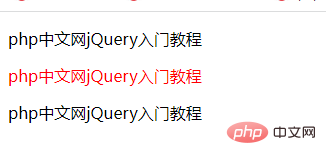What are the ways to find the parent in jquery?
4 methods: 1. parent(), you can find the "parent element" of the current element, the syntax is "$(selector).parent(expression)"; 2. parents(), you can find all Select the ancestor elements of the element, the syntax is "$(selector).parents(expression)"; 3. parentsUntil(), which can find all ancestor elements in the specified range, the syntax is "$(selector).parentsUntil(expression)" ; 4. closest(), the first ancestor element of the selected element.

The operating environment of this tutorial: windows7 system, jquery3.6.1 version, Dell G3 computer.
jquery method of finding parents
parent()
parents()
parentsUntil()
closest()
Method 1: parent()
In jQuery, we can use the parent() method to find the "parent element" of the current element. Remember, elements have only one parent.
Syntax:
$(selector).parent(expression)
Description: The parameter expression represents the jQuery selector expression, used to filter parent elements. When the parameter is omitted, all parent elements are selected. If the parameter is not omitted, the parent element that meets the conditions is selected.
Don’t the elements have only one parent element? Why is there still such a thing as "eligible parent element"? For this, take a look at the following example.
Example:
<!DOCTYPE html>
<html>
<head>
<script src="js/jquery-3.6.1.min.js"></script>
<script type="text/javascript">
$(function() {
$("p").parent(".lvye").css("color", "red");
})
</script>
</head>
<body>
<div>
<p>php中文网jQuery入门教程</p>
</div>
<div class="lvye">
<p>php中文网jQuery入门教程</p>
</div>
<div>
<p>php中文网jQuery入门教程</p>
</div>
</body>
</html>The effect is as follows:

##Method 2: parents()
The parents() method is similar to the parent() method, both are used to find the ancestor elements of the selected element. But these two methods also have essential differences. In fact, these two methods are also easy to distinguish. parent is in singular form, and there is only one ancestor element to be searched for, which is the parent element. Parents is a plural form, and the ancestor elements to be searched are of course all ancestor elements. Syntax:$(selector).parents(expression)
<!DOCTYPE html>
<html>
<head>
<script src="js/jquery-3.6.1.min.js"></script>
<script type="text/javascript">
$(function() {
$("#btn").click(function() {
var parents = $("span").parents()
.map(function() {
return this.tagName;
})
.get().join(",");
alert("span元素的所有祖先元素为:" + parents.toLowerCase());
});
})
</script>
</head>
<body>
<div>
<p><strong><span>jQuery入门教程</span></strong></p>
</div>
<input id="btn" type="button" value="获取" />
</body>
</html>

parentsUntil() method is a supplement to the parents() method. It can find all ancestor elements in the specified range, which is equivalent to intercepting some ancestor elements from the collection returned by the parents() method.
Syntax:
$(selector).parentsUntil(expression)
Description: The parameter expression represents the jQuery selector expression string, used to filter ancestor elements. When the argument is omitted, all ancestor elements are selected. If the parameter is not omitted, the ancestor element that meets the conditions is selected.
The parameter selector represents the jQuery selector expression string, used to determine the ancestor elements of the range. This parameter is optional. If omitted, all ancestor elements will be matched, which is the same as the results of the parents() method.
<!DOCTYPE html>
<html>
<head>
<meta charset="utf-8">
<style>
.ancestors *{
display: block;
border: 2px solid lightgrey;
color: lightgrey;
padding: 5px;
margin: 15px;
}
</style>
<script ></script>
<script>
$(document).ready(function(){
$("span").parentsUntil("div").css({"color":"red","border":"2px solid red"});
});
</script>
</head>
<body class="ancestors"> body (曾曾祖父节点)
<div style="width:500px;">div (曾祖父节点)
<ul>ul (祖父节点)
<li>li (直接父节点)
<span>span</span>
</li>
</ul>
</div>
</body>
<!-- 在这个例子中,我们选择在span和div元素之间的所有祖先元素。 -->
</html>
closest() method returns the first ancestor element of the selected element.
- Starting from the current element
- Traverse up the DOM tree and return the first single ancestor that matches the passed expression
- Returns a jQuery object containing zero or one element
- Syntax:
$(selector).closest(expression)
Example: Returns the th of A parent element is a
<!DOCTYPE html>
<html>
<head>
<meta charset="utf-8">
<style>
.ancestors *{
display: block;
border: 2px solid lightgrey;
color: lightgrey;
padding: 5px;
margin: 15px;
}
</style>
<script ></script>
<script>
$(document).ready(function(){
$("span").closest("li").css({"color":"red","border":"2px solid red"});
});
</script>
</head>
<body class="ancestors">body (曾曾祖先节点)
<div style="width:500px;">div (曾祖先节点)
<ul>ul (第二祖先 - 第二祖先节点)
<ul>ul (第一祖先 - 第一祖先节点)
<li>li (直接父节点)
<span>span</span>
</li>
</ul>
</ul>
</div>
</body>
</html>
The above is the detailed content of What are the ways to find the parent in jquery?. For more information, please follow other related articles on the PHP Chinese website!

Hot AI Tools

Undresser.AI Undress
AI-powered app for creating realistic nude photos

AI Clothes Remover
Online AI tool for removing clothes from photos.

Undress AI Tool
Undress images for free

Clothoff.io
AI clothes remover

Video Face Swap
Swap faces in any video effortlessly with our completely free AI face swap tool!

Hot Article

Hot Tools

Notepad++7.3.1
Easy-to-use and free code editor

SublimeText3 Chinese version
Chinese version, very easy to use

Zend Studio 13.0.1
Powerful PHP integrated development environment

Dreamweaver CS6
Visual web development tools

SublimeText3 Mac version
God-level code editing software (SublimeText3)

Hot Topics
 Detailed explanation of jQuery reference methods: Quick start guide
Feb 27, 2024 pm 06:45 PM
Detailed explanation of jQuery reference methods: Quick start guide
Feb 27, 2024 pm 06:45 PM
Detailed explanation of jQuery reference method: Quick start guide jQuery is a popular JavaScript library that is widely used in website development. It simplifies JavaScript programming and provides developers with rich functions and features. This article will introduce jQuery's reference method in detail and provide specific code examples to help readers get started quickly. Introducing jQuery First, we need to introduce the jQuery library into the HTML file. It can be introduced through a CDN link or downloaded
 How to use PUT request method in jQuery?
Feb 28, 2024 pm 03:12 PM
How to use PUT request method in jQuery?
Feb 28, 2024 pm 03:12 PM
How to use PUT request method in jQuery? In jQuery, the method of sending a PUT request is similar to sending other types of requests, but you need to pay attention to some details and parameter settings. PUT requests are typically used to update resources, such as updating data in a database or updating files on the server. The following is a specific code example using the PUT request method in jQuery. First, make sure you include the jQuery library file, then you can send a PUT request via: $.ajax({u
 How to remove the height attribute of an element with jQuery?
Feb 28, 2024 am 08:39 AM
How to remove the height attribute of an element with jQuery?
Feb 28, 2024 am 08:39 AM
How to remove the height attribute of an element with jQuery? In front-end development, we often encounter the need to manipulate the height attributes of elements. Sometimes, we may need to dynamically change the height of an element, and sometimes we need to remove the height attribute of an element. This article will introduce how to use jQuery to remove the height attribute of an element and provide specific code examples. Before using jQuery to operate the height attribute, we first need to understand the height attribute in CSS. The height attribute is used to set the height of an element
 jQuery Tips: Quickly modify the text of all a tags on the page
Feb 28, 2024 pm 09:06 PM
jQuery Tips: Quickly modify the text of all a tags on the page
Feb 28, 2024 pm 09:06 PM
Title: jQuery Tips: Quickly modify the text of all a tags on the page In web development, we often need to modify and operate elements on the page. When using jQuery, sometimes you need to modify the text content of all a tags in the page at once, which can save time and energy. The following will introduce how to use jQuery to quickly modify the text of all a tags on the page, and give specific code examples. First, we need to introduce the jQuery library file and ensure that the following code is introduced into the page: <
 Use jQuery to modify the text content of all a tags
Feb 28, 2024 pm 05:42 PM
Use jQuery to modify the text content of all a tags
Feb 28, 2024 pm 05:42 PM
Title: Use jQuery to modify the text content of all a tags. jQuery is a popular JavaScript library that is widely used to handle DOM operations. In web development, we often encounter the need to modify the text content of the link tag (a tag) on the page. This article will explain how to use jQuery to achieve this goal, and provide specific code examples. First, we need to introduce the jQuery library into the page. Add the following code in the HTML file:
 Understand the role and application scenarios of eq in jQuery
Feb 28, 2024 pm 01:15 PM
Understand the role and application scenarios of eq in jQuery
Feb 28, 2024 pm 01:15 PM
jQuery is a popular JavaScript library that is widely used to handle DOM manipulation and event handling in web pages. In jQuery, the eq() method is used to select elements at a specified index position. The specific usage and application scenarios are as follows. In jQuery, the eq() method selects the element at a specified index position. Index positions start counting from 0, i.e. the index of the first element is 0, the index of the second element is 1, and so on. The syntax of the eq() method is as follows: $("s
 How to tell if a jQuery element has a specific attribute?
Feb 29, 2024 am 09:03 AM
How to tell if a jQuery element has a specific attribute?
Feb 29, 2024 am 09:03 AM
How to tell if a jQuery element has a specific attribute? When using jQuery to operate DOM elements, you often encounter situations where you need to determine whether an element has a specific attribute. In this case, we can easily implement this function with the help of the methods provided by jQuery. The following will introduce two commonly used methods to determine whether a jQuery element has specific attributes, and attach specific code examples. Method 1: Use the attr() method and typeof operator // to determine whether the element has a specific attribute
 Introduction to how to add new rows to a table using jQuery
Feb 29, 2024 am 08:12 AM
Introduction to how to add new rows to a table using jQuery
Feb 29, 2024 am 08:12 AM
jQuery is a popular JavaScript library widely used in web development. During web development, it is often necessary to dynamically add new rows to tables through JavaScript. This article will introduce how to use jQuery to add new rows to a table, and provide specific code examples. First, we need to introduce the jQuery library into the HTML page. The jQuery library can be introduced in the tag through the following code:






